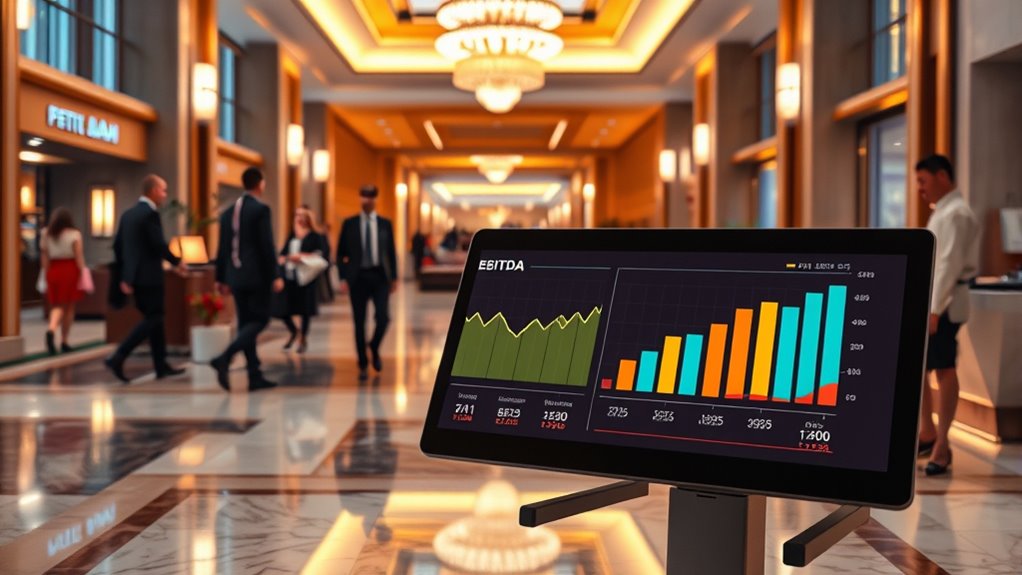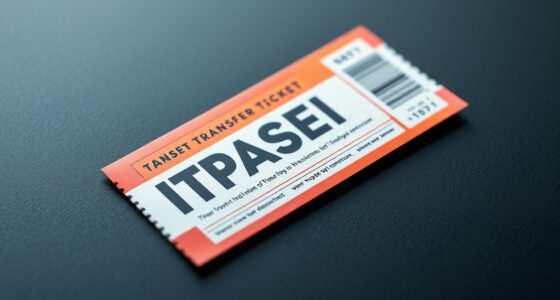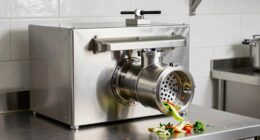In the hospitality context, EBITDA measures your business’s core profitability by excluding interest, taxes, depreciation, and amortization, giving you a clear view of operational performance. It helps you understand how well your hotel, restaurant, or resort is doing without external financial factors influencing the results. By focusing on operational income, EBITDA helps you make smarter decisions, attract investors, and compare properties effectively. Keep exploring to learn how to leverage EBITDA for sharper strategic choices.
Key Takeaways
- EBITDA measures core operational profitability in hospitality by excluding interest, taxes, depreciation, and amortization.
- It helps stakeholders assess efficiency, attract investment, and make strategic decisions about hotel and restaurant performance.
- EBITDA focuses on revenue from core activities like room sales and food services, providing a normalized profitability view.
- Limitations include ignoring capital expenditures, taxes, and financing costs, which can misrepresent true financial health.
- Analyzing EBITDA trends and margins guides operational improvements and strategic growth in hospitality businesses.
Understanding EBITDA and Its Components in Hospitality

Understanding EBITDA is essential for evaluating a hospitality business’s financial health, as it provides a clear picture of operational profitability before accounting for interest, taxes, depreciation, and amortization. EBITDA stands for Earnings Before Interest, Taxes, Depreciation, and Amortization, highlighting the core earnings generated by your operations. To calculate it, start with your net income, then add back interest expenses, taxes, depreciation, and amortization costs. These adjustments remove non-operational factors, giving you a focused view of your business’s performance. In hospitality, this metric helps you assess how well your core activities—like room sales, food, and beverage services—are generating profit. Understanding each component’s role *guarantees* you accurately interpret your financial results and make informed decisions to improve profitability. Additionally, being aware of cybersecurity vulnerabilities is crucial, as disruptions like outages can impact data security and operational continuity.
The Significance of EBITDA for Hospitality Stakeholders

Why does EBITDA matter so much to hospitality stakeholders? Because it directly reflects your business’s profitability and operational efficiency. Knowing your EBITDA helps you make informed decisions, attract investors, and secure financing. It also signals the health of your hotel or restaurant, reassuring partners and lenders. Consider these key points:
EBITDA reveals your business’s profitability, efficiency, and growth potential, inspiring confidence among investors and partners.
- Seizes growth opportunities—EBITDA shows if you have the resources to expand or upgrade.
- Builds investor confidence—a strong EBITDA attracts funding and partnerships.
- Enables performance comparison—benchmark against industry standards with clear numbers.
- Guides strategic planning—identify areas to improve profitability and streamline operations.
Understanding EBITDA empowers you to steer your business confidently toward success in the competitive hospitality landscape.
How EBITDA Differentiates From Other Financial Metrics in Hospitality

While EBITDA is a essential metric for evaluating profitability and operational efficiency, it differs markedly from other financial measures used in hospitality. Unlike net income, EBITDA excludes interest, taxes, depreciation, and amortization, focusing solely on core operational performance. This makes it useful for comparing businesses regardless of their financing or tax structures. In contrast, metrics like net profit reflect all expenses, including those outside daily operations, providing a broader financial picture. Revenue metrics, such as total sales or RevPAR, measure top-line performance but don’t account for costs. EBITDA offers a clearer view of operational cash flow, helping you assess how well a property is run without the noise of financial or accounting decisions outside daily operations. Additionally, understanding essential oils for operational health can metaphorically relate to maintaining balance and efficiency in financial metrics.
Calculating EBITDA for Hotels, Restaurants, and Resorts

Calculating EBITDA for hotels, restaurants, and resorts involves starting with their operating income and then adding back specific expenses such as interest, taxes, depreciation, and amortization. This process reveals the true profitability of your property’s core operations, free from financing and accounting choices. Leveraging AI-driven analysis can further enhance your understanding of these financial metrics for better decision-making. Here are key elements you’ll consider:
Calculating EBITDA reveals the true profitability of your hotel or restaurant’s core operations.
- Operating Income – the revenue earned from your venue’s day-to-day activities.
- Interest Expenses – costs related to loans or debt.
- Taxes – mandatory government payments that don’t reflect operational efficiency.
- Depreciation & Amortization – non-cash expenses that spread out asset costs over time.
Mastering this calculation empowers you to assess performance, attract investors, and make smarter strategic decisions.
Limitations and Considerations When Using EBITDA in Hospitality

While EBITDA provides useful insights, you should be aware of its limitations in hospitality. Non-operational costs can distort the picture, and asset values may vary widely between properties. Additionally, industry-specific factors can make EBITDA less comparable across different segments. It’s important to understand the scope of ethical hacking to ensure accurate interpretation of financial metrics.
Non-operational Cost Influence
Non-operational costs can considerably distort EBITDA figures in the hospitality industry, making it essential to understand their impact. These costs are outside daily operations but still influence your profitability metrics. Ignoring them can lead to misleading conclusions about your business’s true performance.
Here are key considerations:
- One-time expenses like legal fees or restructuring costs can inflate EBITDA temporarily, skewing your view of ongoing profitability.
- Interest expenses affect EBITDA but don’t reflect operational efficiency; high debt can mask operational strength.
- Asset impairments reduce asset value but don’t impact core operations, falsely lowering EBITDA.
- Non-cash charges such as depreciation and amortization can distort profit analysis without reflecting cash flow realities.
Understanding these factors helps you interpret EBITDA accurately and make informed decisions.
Asset Valuation Variability
Have you considered how fluctuations in asset valuations can impact your EBITDA analysis? Changes in property values or equipment worth can distort your EBITDA figures, making them seem better or worse than your operational performance suggests. Since EBITDA doesn’t account for asset appreciation or depreciation, relying solely on it could mislead you about your business’s true health. If you acquire new assets or experience market-driven revaluations, your EBITDA might fluctuate independently of actual earnings. This variability complicates comparisons over time or between properties. You need to recognize that asset valuation swings can skew your interpretation of profitability. To get a clearer picture, consider supplementing EBITDA with other metrics that reflect asset value changes or adjust your analysis to account for these fluctuations. Additionally, understanding the asset valuation process helps in comprehensively assessing your company’s financial health.
Industry-Specific Limitations
In the hospitality industry, relying solely on EBITDA can lead to misinterpretations due to sector-specific factors that influence profitability metrics. You should be aware that EBITDA often overlooks key elements unique to hospitality, such as seasonal fluctuations and high fixed costs. These factors can distort true financial health. Be cautious of these limitations:
- Seasonality: Fluctuating occupancy rates can skew EBITDA, hiding underlying issues.
- Non-Operating Expenses: Costs like franchise fees or management royalties are excluded but impact cash flow.
- Capital Expenditures: Heavy investments in renovations aren’t reflected, risking undervaluation.
- Operational Variability: Differences in management practices can lead to misleading comparisons.
Understanding these nuances helps you avoid false assumptions and make more informed decisions in the hospitality sector.
Practical Examples of EBITDA Analysis in Hospitality Businesses

Understanding EBITDA in real-world hospitality settings requires examining revenue and expense breakdowns to identify key drivers. Comparing profitability metrics across different businesses reveals operational strengths and weaknesses. Additionally, analyzing operational efficiency provides insights that can guide strategic decisions and improve overall performance. Awareness of industry divorce statistics can also inform management about potential risks affecting staff retention and guest satisfaction.
Revenue and Expense Breakdown
Analyzing EBITDA in hospitality requires a clear understanding of revenue streams and expense categories. You need to identify where your income comes from and pinpoint costs that directly impact profitability. This process reveals the true financial health of your business and highlights areas for improvement. Consider these key elements:
- Revenue sources like room bookings, food and beverage sales, and event hosting—each impacting cash flow.
- Operating expenses such as wages, utilities, and supplies—controllable costs that influence profitability.
- Fixed expenses like rent and insurance—ongoing costs that must be managed carefully.
- Variable expenses, fluctuating with occupancy and sales—crucial for accurate EBITDA calculation.
Additionally, understanding how cost control strategies affect these components can significantly improve your EBITDA performance.
Understanding these components helps you make smarter decisions that drive growth and enhance profitability.
Profitability Metrics Comparison
By examining real-world examples of EBITDA calculations across different hospitality businesses, you can better grasp how revenue streams and expenses influence profitability metrics. For instance, a hotel with high room rates but substantial operating costs may have a lower EBITDA margin than a boutique inn with lower revenue but tighter expense control. Comparing these metrics helps identify operational strengths and weaknesses. Consider the following:
| Business Type | EBITDA Margin (%) |
|---|---|
| Luxury Hotel | 25 |
| Mid-Range Hotel | 18 |
| Boutique Inn | 30 |
This comparison reveals that smaller or niche businesses can sometimes outperform larger ones in profitability, emphasizing the importance of analyzing EBITDA relative to specific operational contexts. Additionally, understanding how cost management strategies impact EBITDA can lead to more informed decision-making. Such insights guide strategic decisions to improve overall financial health.
Operational Efficiency Insights
Examining EBITDA figures from various hospitality businesses reveals how operational efficiency directly impacts profitability. When you optimize your operations, you *unleash* significant financial benefits. Consider these insights:
- Increasing staff productivity can boost your EBITDA margin by reducing labor costs without sacrificing service quality.
- Streamlining inventory management minimizes waste, directly improving your bottom line.
- Implementing energy-saving measures lowers expenses, making your EBITDA more resilient.
- Enhancing booking processes reduces vacancy rates, increasing revenue and EBITDA stability.
- Utilizing best vacuum technology can improve cleanliness standards efficiently, positively affecting guest satisfaction and operational costs.
Focusing on these operational aspects transforms EBITDA from just a number into a reflection of your business’s efficiency. By identifying and improving key areas, you create a more profitable, competitive hospitality operation that thrives even in challenging markets.
Leveraging EBITDA for Strategic Decision-Making and Valuation

Leveraging EBITDA is vital for making informed strategic decisions and accurately valuing hospitality businesses. By focusing on EBITDA, you can assess operational profitability independently of financing, taxes, and accounting methods. This metric allows you to compare different properties or brands objectively, helping identify which assets generate the most value. When evaluating potential acquisitions or expansion opportunities, EBITDA provides a clear picture of cash flow potential and overall financial health. It’s also indispensable for negotiations, as buyers and sellers rely on EBITDA to determine fair value. Additionally, tracking EBITDA trends over time helps you spot operational strengths or weaknesses, guiding strategic adjustments. Recognizing the importance of for-sale 100 inventory levels can also impact EBITDA calculations and overall profitability. Ultimately, understanding and utilizing EBITDA effectively empowers you to make smarter decisions that enhance profitability and growth.
Frequently Asked Questions
How Does Seasonality Affect EBITDA Calculations in Hospitality?
Seasonality impacts your EBITDA calculations by causing fluctuations in revenue and expenses throughout the year. When demand peaks, your revenues increase, boosting EBITDA; during off-peak times, revenues drop, lowering it. To accurately assess your financial performance, you should adjust for these seasonal variations, often by analyzing average monthly figures or using seasonally adjusted data. This helps you make better-informed decisions and compare performance across different periods effectively.
What Are Common EBITDA Adjustments Specific to Hospitality Businesses?
Imagine uncovering hidden costs that can dramatically shift your financial view. You might need to adjust for one-time expenses like renovations, write-offs, or legal fees that don’t reflect ongoing operations. Seasonal fluctuations, management bonuses, or promotional expenses also often require adjustment. These hospitality-specific EBITDA adjustments help you see the true profitability, stripping away anomalies to reveal the real story behind your numbers.
How Do Franchise Agreements Impact EBITDA Reporting?
Franchise agreements impact your EBITDA reporting by affecting revenue and expenses. You need to include franchise fees, royalties, and marketing contributions as operating expenses, which reduce your EBITDA. On the other hand, any franchise-related income, like fee reimbursements or support payments, can increase EBITDA. It’s important to clearly track these items separately to accurately reflect your business’s profitability, ensuring transparency and consistency in your financial statements.
Can EBITDA Accurately Reflect Cash Flow in Hospitality Operations?
You might think EBITDA perfectly shows your cash flow, but that’s a charming misconception. In reality, EBITDA ignores essential cash expenses like debt payments and capital expenditures. So, while it looks impressive on paper, it can be misleading for your hospitality operations. You need to dig deeper into actual cash flow statements to truly understand your financial health, beyond EBITDA’s shiny surface.
How Does Depreciation Influence EBITDA in Hospitality Asset Valuation?
Depreciation impacts EBITDA because it’s an expense deducted from revenue, reducing profit figures. When evaluating hospitality assets, you might see lower EBITDA if depreciation is high, but it doesn’t reflect actual cash flow since depreciation is non-cash. Recognizing this, you understand that while depreciation influences EBITDA, it shouldn’t be the sole measure of an asset’s financial health or value.
Conclusion
Think of EBITDA as a clear stream flowing through the hospitality landscape, offering a glimpse of your business’s core strength. While it guides your decisions like a gentle compass, remember it’s just one part of the broader terrain. Keep your view balanced, appreciating both its clarity and its limits. By understanding EBITDA’s flow, you can navigate toward smarter strategies and brighter horizons, ensuring your hospitality venture remains resilient and thriving amidst changing currents.









